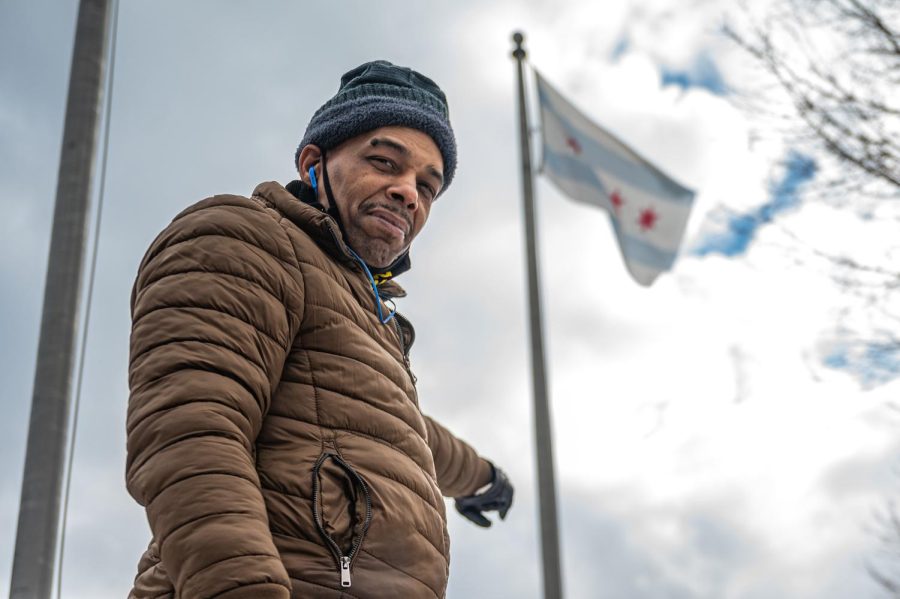Survivors of police torture fight for justice and healing
Mark Clements, a police torture survivor, stands in front of the Woodlawn Health Clinic. The Chicago Torture Justice Center will move in to the clinic after outgrowing their old space in Englewood.
March 7, 2022
It was the summer of 1981. Mark Clements, Black and at the time 16 years old, was accused of setting an apartment building on fire, killing four people. There was no evidence, no witness. A resident who lived nearby had told the police they saw Mr. Clements shortly after the incident collecting empty bottles across from the building that had caught on fire. Desperate to blame someone, the police officers in charge arrested Mr. Clements. After being brought to the police station, Mr. Clements was beaten by a detective until he confessed.
An accusation, a coerced confession fabricated by the Chicago Police Department under Jon Burge’s command, and the color of his skin were enough for Mr. Clements to be convicted on four counts of manslaughter and sentenced to prison for the rest of his natural life. He would be the second Illinois juvenile to receive this sentence. His case was later reinvestigated, and Mr. Clements was freed after unjustly spending 28 years in prison.
Fast forward to today, and Mr. Clements works at the Chicago Torture Justice Center, a nonprofit organization advocating for victims like himself who have been subjected to police torture and other forms of police brutality.
The Chicago Torture Justice Center serves as a resource center for men and women who remain incarcerated and an outreach center once they are released. Although the organization offers a number of services, including psychological counseling for victims, career coaching and financial support, the majority of Mr. Clement’s job as an organizer entails assisting and advising victims throughout the legal process.
“I am not an attorney, but I can help them with advice regarding obtaining a fair judge and attorney, the physical documentation and family affairs and more,” he said. “I am basically helping them fight against a criminal justice system that has wronged them so greatly.”
Mr. Clements said most of the CTJC’s clients are Black and brown, and a lot of them are unable to understand legal technicalities.
“The numbers we see today reflect the bias of the CPD,” he said. “When they are called to Black and brown communities, they conduct themselves in a completely different way. In most instances, the residents cannot even communicate with them. They take advantage of that.”
The CTJC has assisted over 1,000 victims and hopes to grow its impact. To accommodate the organization’s goals, specifically the increase in outreach and staff, the center will move to a bigger location in mid-March.
“We still want people to have easy access to our center, including those who are nonwealthy, from nonwealthy communities, and are also looking to expand our services,” Mr. Clements said.
Although the city of Chicago funds the CTJC, Mr. Clements said the most significant challenge the center has encountered is funding. Chicago has authorized nearly $70 million in reparations due to police misconduct, but Mr. Clements said this is not enough.
“The Chicago government knows the number of men and women unfairly put in prison, they recognize that torture survivors were released without any kind of aid, so you would think they would help more, but they don’t,” he said.
Mr. Clements emphasized the importance of coming together as a community and helping enact change.
“People can go to our website and consider donating to the survivor’s relief fund, a fund that actually provides revenue back into the lives of these men and women that are struggling,” he said.
It is now the winter of 2022. The Chicago Torture Justice Center is helping hundreds of victims who have gone through the same experiences as Mr. Clements, slowly but surely spreading awareness of the CPD’s past and holding their wrongdoings accountable.
“We all have to learn in this life. It is a hellish experience, what some of us had to experience in this life,” Mr. Clements said. “My experience and the experiences that others have lived through must live on. We have to be able to identify what is causing the harm in this society together.”




























































